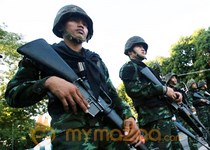A Cabinet minister who defied an order to report to Thailand's new military junta emerged Tuesday from hiding to condemn last week's coup in the first public comment from a member of the former government.
Education Minister Chaturon Chaisang had defied a summons to report to the junta, which has detained most top members of the ousted elected government in this Southeast Asian nation since taking power last Thursday.
"Coup d'Θtat is not a solution to the problems or conflicts in Thai society, but will make the conflicts even worse," Chaturon said. "I would like to stress that a coup d'Θtat is itself an abrogation of democracy, and therefore it cannot possibly create rules that will improve democracy."
Chaturon spoke to the media at the Foreign Correspondents' Club of Thailand in Bangkok. He said he would not resist arrest or go underground, but "I still insist to use my own rights and liberty to call for returning the country to democracy."
Last Thursday's coup, Thailand's second in eight years, deposed an elected government that had insisted for months that the nation's fragile democracy was under attack from protesters, the courts, and finally the army.
The country is deeply split between an elite establishment based in Bangkok and the south that cannot win elections on one side, and a poorer majority centered in the north that has begun to realize political and economic power on the other.
Gen. Prayuth Chan-ocha, the nation's new military ruler, had warned coup opponents Monday not to criticize or protest, saying the nation could revert to the "old days" of turmoil and street violence if they did.
Still, small numbers of protesters have gathered on Bangkok streets in defiance of martial law. Several hundred people gathered Monday at Victory Monument and eventually dispersed on their own, vowing to return some time Tuesday.
Monday's protest was tense but nonviolent, as others have been since last week, when the army first declared martial law and then announced it was taking over the government.
Through a loudspeaker, a soldier taunted the protesters, saying they had been paid to come out. "Can you still call yourselves patriots?" he said.
The soldier also accused international journalists at the scene of inciting conflict. "Do you think they are good for Thailand?" he said, before addressing them directly in English: "Foreign media, you be careful."
After declaring martial law May 20, Prayuth invited political rivals and Cabinet ministers for two days of peace talks to resolve the crisis. But those talks lasted just four hours. At the end of the meeting, Prayuth ordered everyone inside detained, and announced the coup on state television almost immediately afterward.
The junta has ordered more than 200 people -- including most of the ousted government -- to report to the authorities. They include scholars, journalists and political activists seen as critical of the regime.
Those summoned included former Prime Minister Yingluck Shinawatra, who already had been removed from power at the time of last week's imposition of martial law.
An aid said she was released Monday from military custody after being held for three days at an undisclosed location without access to a telephone. The aide, who spoke on condition of anonymity because of the sensitivity of the situation, said Yingluck had returned to her home.
Some of the others also have been released, but others are being summoned daily -- including several more late Monday. Other activists have fled or are in hiding, and human rights groups describe a chilling atmosphere with soldiers visiting the homes of perceived critics and taking them away.
Prayuth said the army was taking people into custody to give them time "to calm themselves down" and none was being tortured or beaten.
"When summoned, they will be asked about what they've done. ... If they are calm and still, they will be released, in three days, five days, seven days," Prayuth said.
On Monday, the army also released ex-lawmaker Suthep Thaugsuban, who led half a year of demonstrations against the deposed government.
Suthep was escorted to the criminal court by security officers and formally charged with murder for giving the army orders to crack down on protesters in 2010 when he was serving as deputy prime minister. But he was immediately released on bail and grinned broadly as walked out of the courthouse.
The junta has yet to map a way out of the crisis, but Prayuth said there would be political and administrative reforms. On Monday, he gave the green light for the Finance Ministry to seek billions of dollars in loans to pay debts owed farmers under a disastrous rice scheme instituted by the ousted government.







